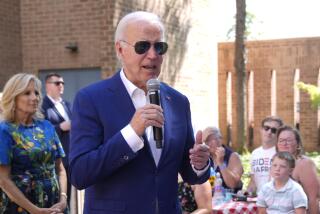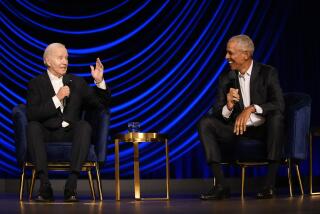Obama talks real estate with Zillow
President Obama paused on his trip through Los Angeles on Wednesday to sit for wide-ranging questions on housing and mortgage finance policy.
But the live-streamed discussion was less notable for the content — the president broke little news, and fielded no hardball questions — than for the medium: the real estate listings website Zillow, known more for estimating home values than political coverage.
The exchange, which had the feel of a digital town hall meeting, highlighted both the rapidly shifting digital media landscape and the rising prominence of specialized websites such as Zillow, which is based in Seattle but has operations in Irvine and San Francisco.
Real estate information companies like Zillow — including Trulia and Redfin — have expanded well beyond listings and into sophisticated data mining and analysis of national and regional markets. Traditional media organizations routinely cover data releases from the companies and cite their economists. The companies make money through advertising and directing leads to real estate agents and lenders. Redfin, unlike the others, employs its own agents.
Such websites are gaining market share in advertising and other digital revenue streams — Zillow has seen its stock more than double this year. At the same time, traditional media companies have struggled to maintain profits.
Case in point: Monday’s announcement that Amazon.com founder Jeffrey Bezos — who changed the way books are bought and sold online — would buy the Washington Post for $250 million. That newspaper, owned by the dynastic Graham family for eight decades, has struggled to remain profitable amid heavy competition from the Web and declining circulation.
For the president, Zillow appeared to offer a friendly forum to speak to an audience keenly interested in housing markets and policy. Obama sat down with Zillow Inc. Chief Executive Spencer Rascoff, who acted more as a moderator than a journalist.
Presidents have a long tradition of trying to control their message, from Franklin D. Roosevelt’s “fireside chats” to George W. Bush’s targeting of local news outlets. In the Internet era, however, the Obama White House has proved particularly adept at using the Web and social media to target its audience and side-step traditional media.
“They really do an expert job, for an institution, coming across as personable and in the moment” on social media, said Robin J. Phillips, digital director of the Donald W. Reynolds National Center for Business Journalism at Arizona State University. “This is a further extension of that. And his message this week, in his trip throughout the Southwest, is all about housing. So why not use Zillow, which is a consumer website?”
The president built a legion of followers on Facebook and Twitter during his two presidential campaigns. In his first prime-time news conference, the president made waves by calling on a reporter from the online-only news outfit Huffington Post to ask a question. During his reelection run in 2011, the president participated in a town hall meeting with Facebook founder and Chief Executive Mark Zuckerberg to discuss the economy. And last summer the president participated in an hour-long discussion on the website Reddit.
The online discussion offered a marketing opportunity for Zillow, said James Cakmak, an analyst with Telsey Advisory Group. Cakmak said the Obama chat is part of a larger Zillow marketing strategy — including national television spots — to drive consumers to its massive online real estate database, one he said that has sent Web traffic soaring this year.
Cakmak said Zillow makes most of its money from real estate agents who pay to be featured on its website. Wednesday’s question-and-answer session is likely to have a larger effect on those in the industry, giving the online website increased clout among agents, journalists and others wrapped up in real estate day to day.
“It does build the brand in the eyes of the real estate industry,” he said.
The unconventional appearance was a win on many levels for the president, said Gabriel Kahn, a professor at USC’s Annenberg School for Communication and Journalism.
The live show allowed the president to keep the discussion targeted on his housing priorities, without the worry of unexpected or pointed questions from political reporters. And the novelty of the forum brought extra attention.
A traditional news conference or a one-on-one with a veteran journalist puts the president at risk, Kahn said. “You are going to get questions about Putin and from all over the place, because that is a reporter’s duty, and he is not going to be able to define the message as well,” he said.
Others dismissed the discussion, and Zillow itself, as puffery designed to entertain rather than inform. On its website, the National Assn. of Realtors, a major lobbying group for the real estate industry, called the chat “not a serious public policy discussion.”
“Because of NAR’s leadership in the advocacy arena, our sources tell us that the White House did not want to get caught in a conflict of interest with us,” the group wrote. “In contrast, Zillow has no such conflicts, since they are a housing entertainment website, not an influential real estate advocacy organization.”
During the talk the president reiterated his call for the passage of a broad housing agenda.
More to Read
Inside the business of entertainment
The Wide Shot brings you news, analysis and insights on everything from streaming wars to production — and what it all means for the future.
You may occasionally receive promotional content from the Los Angeles Times.










